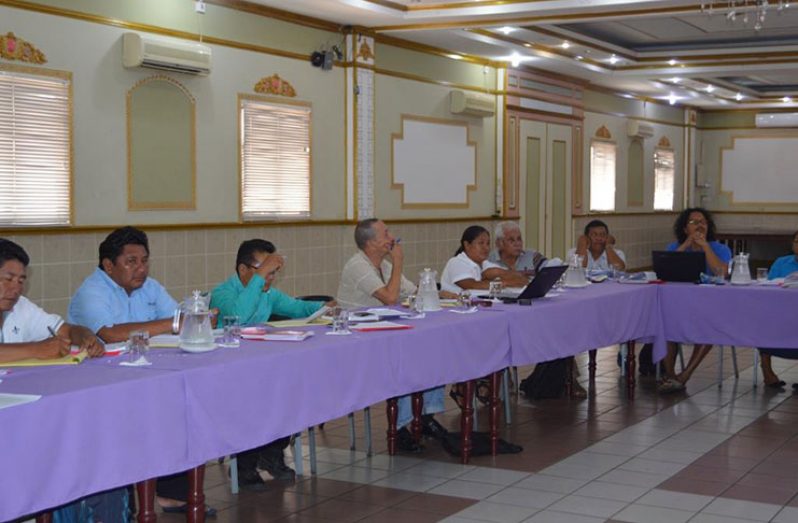–as consultations continue on revision of Amerindian Act
THE Steering Committee for revision of the Amerindian Act (2006) on Thursday concluded a four-day workshop to prepare persons to facilitate consultations on the revision of the legislation.
The workshop brought together indigenous representatives from several organisations, villages and regions across Guyana.
According to Communications Officer Nicolas Peters, the workshop saw persons being trained to input information on key sections of the Amerindian Act, and what that information would mean to amendment of the legislation.
“These facilitators,” Peters said, “are expected to support communities in building capacity towards the effective and organised presentation of information for revision of the Act, which will then be submitted to the Ministry of Indigenous Peoples’ Affairs.”
Earlier this month, the Steering Committee met with the Minister of Indigenous Peoples’ Affairs, Sydney Allicock, in an effort to find synergy for implementation of the revision process.
While both Minister Allicock and Minister within the Ministry of Indigenous Peoples’ Affairs, Valerie Garrido-Lowe, have declared the committee’s proposed strategy “a commendable document”, the revision process in itself will be done separately, since, according to the ministry, the government has its own role to play within the ambit of their responsibility.
The Ministry of Indigenous Peoples’ Affairs has indicated that there will be opportunities for recommendations coming out of parallel independent processes during the consultations to coalesce where possible.
The function of the committee is to guide a formal independent process towards revision of the Amerindian Act of 2006.
This move follows repeated calls from various indigenous leaders, their communities, and organisations to amend or revise the 2006 legislation to ensure that the language is in line with international laws, and are contained therein.
The Steering Committee consists of national and grassroots organisations such as the Amerindian Peoples’ Association (APA),the National Toshaos Council (NTC),the Guyana Organisation of Indigenous Peoples (GOIP),the North Rupununi District Development Board (NRDDB),The Amerindian Action Movement of Guyana (TAAMOG), and the National Amerindian Development Foundation (NADF).
Also included in the grouping are various district councils such as the Upper Mazaruni District Council (UMDC),the South Rupununi District Council (SRDC),the North Pakaraimas District Council (NPDC) and the Moruca District Council (MDC).
Peters said that the Steering Committee will be guided by a framework, which was developed by representatives out of prior meetings between organisations and district councils, that outlined a Code of Conduct; a workplan that includes identification and training of facilitators to conduct consultations; Consultation Strategy with timelines; a Communication Strategy and Feedback Mechanism, and a budget.
Initial discussions and arrangements to source independent technical and legal experts have been initiated. These experts will support the work of the committee under clearly defined Terms of References collectively drafted by the committee.
He also said that the Steering Committee will function as a body that will develop, propose, oversee, and approve different duties aimed at ensuring an effective revision process.
Among its functions will be to: develop principles for the review process; share progress reports on the revision process; liaise with legislative officials of the National Assembly; and conduct workshops to build community capacity in engaging with the process.
The committee plans to continue seeking meetings with the Minister of Indigenous Peoples’ Affairs and his ministry, to chart the way forward on the process in other areas.
The move to kick-start the revision process for the Amerindian Act 2006 began in March 2017, when a meeting of Indigenous Peoples’ representatives was co-hosted by the APA and NTC.
This meeting discussed the pros and cons of the Amerindian Act, including indigenous peoples’ land and resource rights; protected areas systems and conservation programmes; the extractive sector and their impacts on indigenous peoples; and decision-making mechanisms among other issues.
Following the conclusion of this meeting, a final report was compiled on the way forward, which led to development of the Terms of Reference for the current Steering Committee.
The Terms of Reference was subsequently adopted by the involved organisations in December 2017, and will guide the committee on its functions as it continues to advocate for amendment of the Amerindian Act 2006.



.jpg)









